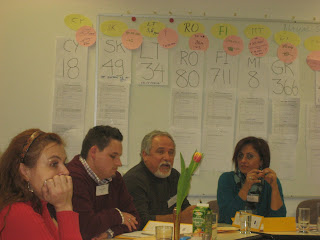 The Central Training is a TRIALOG seminar for development NGO platforms from new EU member states (NMS). For this year’s Central Training, which took place between February 24- 26 in Vienna, we chose the topic of “Financial Sustainability of National Platforms“ since several NMS platforms expressed the need for such a discussion and exchange. The training was organised in close cooperation with the Latvian platform LAPAS and the Polish Platform Grupa Zagranica.
The Central Training is a TRIALOG seminar for development NGO platforms from new EU member states (NMS). For this year’s Central Training, which took place between February 24- 26 in Vienna, we chose the topic of “Financial Sustainability of National Platforms“ since several NMS platforms expressed the need for such a discussion and exchange. The training was organised in close cooperation with the Latvian platform LAPAS and the Polish Platform Grupa Zagranica.Each NMS platform was invited to participate with the coordinator and a board representative which made up a good group of high level platform representatives who presented the current financial situation of their platforms as well as received new input for their work from the exchange with others and from the speakers’ presentations.

Hans Zomer from the Irish platform Dochas talked about the Dochas strategy on sustainability and about fundraising in a cold climate. CONCORD board member Rilli Lappalainen from the Finnish platform Kehys gave a presentation about regional programmes (such as the FEST project between Finland, Estonia and Sweden) as one way to support the sustainability of platforms. Representatives from Light for the World and Greenpeace Central and Eastern Europe shared their experiences about fundraising methods such as communication with major donors, street collections and so on. The question about whether fundraising methods can be copy-pasted to emerging markets was answered differently - not all methods work in all countries, but it might be worth trying out some ideas in the NMS context. As is the case every year, also CONCORD news and priorities for the current year were presented, this time by Policy Officer An Van Goey.

As a result of the training, the need to further assess the financial situation of NMS platforms and the need for national platforms to develop financial strategies as well as to find joint approaches at the European level was felt very urgently. Most of the NMS platforms do not have secured core funding for their activities but depend on project money from governments or other sources, which makes long term financial planning difficult. The very low national platform membership fees often lie even below the level of the CONCORD membership fee of the respective platform. The financial crisis has already had a direct impact on the situation of the development NGO sector in most NMS. Although ODA budget cuts are not limited to NMS, in NMS the cuts are happening at a time when public awareness of, and governmental commitment to, poverty eradication around the globe is less well-established.
The feedback after the Central Training showed that the event was highly valued by the participants as a unique opportunity to discuss issues of vital importance to NMS platforms. Read some quotes:

- The training was excellent and contributed enormously to my understanding.
- It was interesting to see that having a financial strategy is vital for the platform. Here I learned some pretty interesting tips and ideas that will help us to do a very well structured strategy, but also interesting ideas for fundraising.
- What I got from this training is networking, new contacts, maybe not completely new ideas but new approaches to already existing ideas and fun and pleasure.
- For me, it was interesting. Maybe it was not a training in a pure meaning, but for the first time since really a long time we had the chance to openly discuss all the financial questions with the other platform coordinators.
Thanks a lot to all participants and speakers for their input and engagement! Now it is up to all of us not to stop but to incorporate the outcomes in our daily work...
The documentation of the 2009 Central Training (incl. presentations, more quotes/video messages,..) will become available on the TRIALOG website soon. Photos are already available. Visit: http://www.trialog.or.at/start.asp?ID=195
Information provided by Anita Bister, TRIALOG







